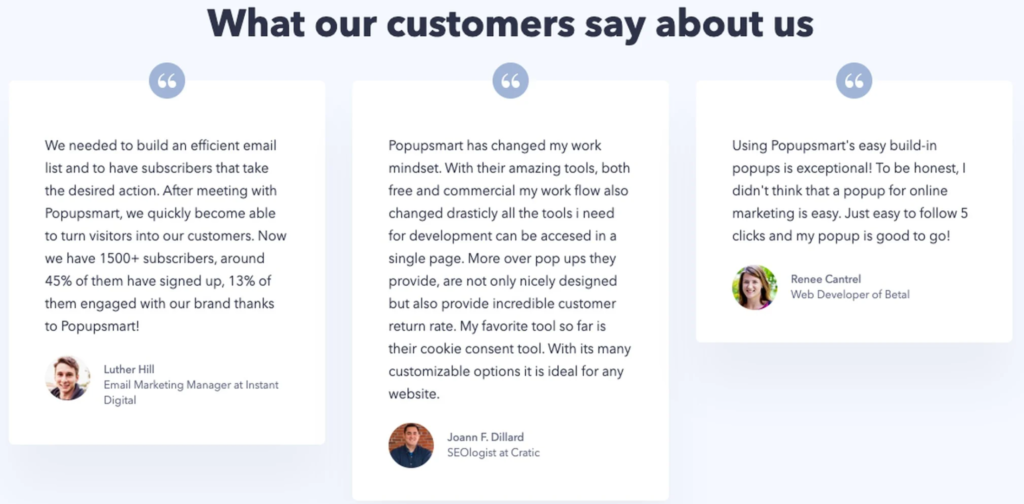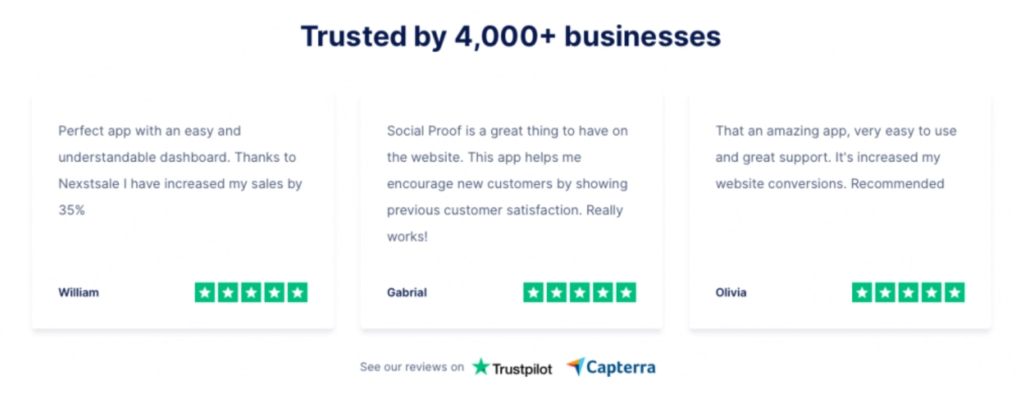What is Social Proof?
Social proof is a fascinating psychological phenomenon deeply ingrained in human behavior. At its core, it represents the inclination of individuals to look to the actions and opinions of others for guidance when making decisions. It serves as a fundamental aspect of our social nature and influences numerous facets of our daily lives, both online and offline.
The internet has amplified the impact of social proof, making it a cornerstone of online marketing and user experience. Websites, businesses, and platforms leverage social proof to gain the trust and confidence of their online visitors. This trust is a precious commodity in the digital realm, where face-to-face interactions are often absent.

Does Social Proof Work?
To determine the effectiveness of social proof, we turned to growth experts for their insights.
According to John Smith, a seasoned growth hacker, “Social proof is like the digital word-of-mouth. When potential customers see that others have had positive experiences with a product or service, it builds trust and credibility. It can significantly impact conversion rates.”
Sarah Johnson, a digital marketing strategist, adds, “The key is to use social proof authentically. Fake testimonials or inflated numbers can backfire and damage your brand’s reputation. It’s essential to collect genuine feedback and use it to your advantage.”
Types of Social Proof:
Case Studies: Case studies are detailed narratives that showcase how a particular customer or client benefited from your product or service. They typically include specific challenges faced, solutions implemented, and measurable results achieved.
Case studies work by presenting a real-life success story that potential customers can relate to. They provide a deeper understanding of your product’s value by demonstrating its practical application.
Advantages:
- Establishes credibility by showing real-world success.
- Demonstrates problem-solving abilities.
- Provides concrete evidence of the product’s effectiveness.


Testimonials: Testimonials are short, written or spoken endorsements from satisfied customers or clients. They are typically brief and highlight the positive experiences and outcomes they’ve had with your product or service. They offer social validation and assurance.
Advantages:
- Provide immediate proof of customer satisfaction.
- Evoke trust through relatable customer experiences.
- Can be easily integrated into various parts of your website.

Reviews: Reviews are user-generated feedback and ratings typically found on third-party platforms like Yelp, Google, or Trustpilot.
They work by showcasing the collective opinions of a wide range of customers. Positive reviews highlight the strengths of your offering, while negative ones can help you identify areas for improvement.
Advantages:
- Provide an unbiased perspective on your product or service.
- Influence purchase decisions based on the wisdom of the crowd.
- Encourage user engagement and feedback.

Social Media: Social media social proof involves the likes, shares, comments, and follows your content receives on platforms like Facebook, Twitter, and Instagram.
It leverages the principle of social influence. When users see that your content is being engaged with by others, they are more likely to perceive it as valuable and relevant.
Advantages:
- Increases the visibility and reach of your content.
- Fosters a sense of community and connection.
- Validates your brand’s authority and popularity.


- Trust Icons: Trust icons, also known as trust badges or trust seals, are a type of social proof displayed on websites to convey a sense of security, reliability, and trustworthiness to visitors. These icons are typically small images or symbols that represent third-party certifications, affiliations, or security measures that the website adheres to. They are strategically placed in areas where users might have concerns or reservations, such as during the checkout process or on landing pages.
Advantages:
- Enhanced credibility to your website, especially if they represent well-known organisations or industry standards.
- When customers feel more secure, they are more likely to complete transactions, sign up for services, or provide their contact information.
- Alleviates concerns about online payment security.


How and when to use social proof on your site?
The strategic implementation of social proof can be a game-changer for your website’s success, but it’s essential to tailor it to your specific goals and target audience.
- Product Pages: Display reviews, testimonials, and case studies on product pages to influence purchase decisions.
- Landing Pages: Utilise trust icons, testimonials and data/numbers prominently on landing pages.
- Checkout Process: Incorporate trust icons to reassure customers during the payment process.
- Home Page: Showcase overall user numbers or social media engagement to demonstrate your website’s popularity. You can also add testimonials that offer insights into how your products/services can solve their problems.

Social proof reflects our innate tendency to seek guidance from the actions and opinions of others when making decisions. The insights from growth experts underscore the effectiveness of social proof in building trust and credibility among potential customers.
Implementing social proof strategically on your website can make a significant difference in achieving your goals and connecting with your target audience. Whether it’s on product pages, landing pages, during the checkout process, or prominently displayed on the home page, social proof can enhance your website’s success by fostering trust, demonstrating value, and reassuring visitors that they are making informed decisions.

